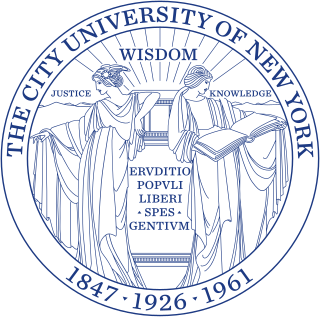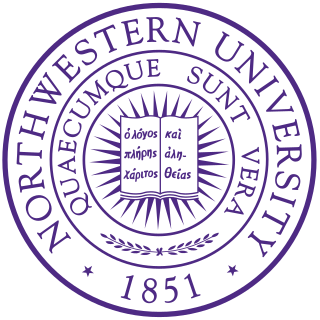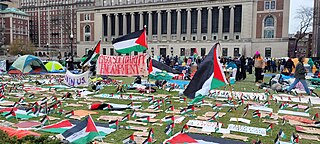
The City University of New York is the public university system of New York City. It is the largest urban university system in the United States, comprising 25 campuses: eleven senior colleges, seven community colleges, and seven professional institutions. In 1960, John R. Everett became the first chancellor of the Municipal College System of New York City, later known as the City University of New York (CUNY). CUNY, established by New York State legislation in 1961 and signed into law by Governor Nelson Rockefeller, was an amalgamation of existing institutions and a new graduate school.

Hampshire College is a private liberal arts college in Amherst, Massachusetts. It was opened in 1970 as an experiment in alternative education, in association with four other colleges in the Pioneer Valley: Amherst College, Smith College, Mount Holyoke College, and the University of Massachusetts Amherst. Together they are known as the Five College Consortium. The campus also houses the National Yiddish Book Center and Eric Carle Museum, and hosts the annual Hampshire College Summer Studies in Mathematics.

Student activism or campus activism is work by students to cause political, environmental, economic, or social change. In addition to education, student groups often play central roles in democratization and winning civil rights.
Disinvestment refers to the use of a concerted economic boycott to pressure a government, industry, or company towards a change in policy, or in the case of governments, even regime change. The term was first used in the 1980s, most commonly in the United States, to refer to the use of a concerted economic boycott designed to pressure the government of South Africa into abolishing its policy of apartheid. The term has also been applied to actions targeting Iran, Sudan, Northern Ireland, Myanmar, Israel, and China.

Lee Carroll Bollinger is an American attorney and educator who served as the 19th president of Columbia University from 2002 to 2023 and as the 12th president of the University of Michigan from 1996 to 2002.

Controversies of the former Iranian President Mahmoud Ahmadinejad included criticism after his election victory on June 29, 2005. These include charges that he participated in the 1979-1981 Iran Hostage Crisis, assassinations of Kurdish politicians in Austria, torture, interrogation and executions of political prisoners in the Evin prison in Tehran. Ahmadinejad and his political supporters have denied these allegations.

Hamid Dabashi is an Iranian-American professor of Iranian Studies and Comparative Literature at Columbia University in New York City.

Hamilton Hall is an academic building on the Morningside Heights campus of Columbia University on College Walk at 1130 Amsterdam Avenue in Manhattan, New York City, serving as the home of Columbia College. It was built in 1905–1907 and was designed by McKim, Mead & White in the Neoclassical style; the building was part of the firm's original master plan for the campus. The building was the gift of the John Stewart Kennedy, a former trustee of Columbia College, and is named after Alexander Hamilton, who attended King's College, Columbia's original name. A statue of Hamilton by William Ordway Partridge stands outside the building entrance. Hamilton Hall is the location of the Columbia College administrative offices.

Mahmoud Ahmadinejad is an Iranian principlist and nationalist politician who served as the sixth president of Iran from 2005 to 2013. He is currently a member of the Expediency Discernment Council. He was known for his hardline views and nuclearisation of Iran. He was also the main political leader of the Alliance of Builders of Islamic Iran, a coalition of conservative political groups in the country, and served as mayor of Tehran from 2003 to 2005, reversing many of his predecessor's reforms.

Robert Elliot Pollack is an American academic, administrator, biologist, and philosopher, who served as a long-time Professor of Biological Sciences at Columbia University.
Activism has played an important role in the history of Ohio Wesleyan University; The founders of Ohio Wesleyan University expressed a hope that the university "is forever to be conducted on the most liberal principles." OWU has espoused activism in its academic philosophy. Alumni of the school have prominently engaged in controversial issues of their times on three central issues—the scope of justice; distributive justice based on race, gender, and income; and institutions related to preserving social structures.

Michael Scott Roth is an American academic and university administrator. He became the 16th president of Wesleyan University in 2007. Formerly, he was the 8th president of the California College of the Arts (2000–2007), associate director of the Getty Research Institute in Los Angeles, and Director of European Studies at Claremont Graduate University. He was also the H.B. Professor of Humanities at Scripps College, where he was the founding director of the Scripps College Humanities Institute.

Disinvestmentfrom South Africa was first advocated in the 1960s in protest against South Africa's system of apartheid, but was not implemented on a significant scale until the mid-1980s. A disinvestment policy the US adopted in 1986 in response to the disinvestment campaign is credited with playing a role in pressuring the South African government to embark on negotiations that ultimately led to the dismantling of the apartheid system.

Nemat Talaat Shafik, Baroness Shafik, commonly known as Minouche Shafik, is a British-American academic and economist. She has been serving as the 20th president of Columbia University since July 2023. She previously served as president and vice chancellor of the London School of Economics from 2017 to 2023.

The Presidency of Mahmoud Ahmadinejad consists of the 9th and 10th governments of the Islamic Republic of Iran. Ahmadinejad's government began in August 2005 after his election as the 6th president of Iran and continued after his re-election in 2009. Ahmadinejad left office in August 2013 at the end of his second term. His administration was succeeded by the 11th government, led by Hassan Rouhani.

Students for Justice in Palestine is a pro-Palestinian college student activism organization in the United States, Canada and New Zealand. It has campaigned for boycott and divestment against corporations that deal with Israel and organized events about Israel's human rights violations. In 2011, The New York Times reported that "S.J.P., founded in 2001 at the University of California, Berkeley, has become the leading pro-Palestinian voice on campus."

Fossil fuel divestment or fossil fuel divestment and investment in climate solutions is an attempt to reduce climate change by exerting social, political, and economic pressure for the institutional divestment of assets including stocks, bonds, and other financial instruments connected to companies involved in extracting fossil fuels.

Similar to many undergraduate campuses across the United States, Northwestern University has had multiple student protests, some contemporary, but most are concentrated in the 1960s and early 1970s. Subjects of protests include anti-war sentiments, black student relations, and more.
The 2021–2022 Columbia University strike was a labor strike involving graduate student workers at Columbia University in New York City. The strike began on March 15, 2021, and ended on May 13, 2021. However, additional strike action commenced on November 3 and lasted until January 7, 2022, when a tentative agreement with the university was reached. The strike was organized by the Graduate Workers of Columbia–United Auto Workers Local 2110 (SWC–UAW), a labor union representing student workers at the university. The goals of the strike were an increase in wages, increased healthcare and childcare coverage, and third-party arbitration in cases of discrimination and sexual harassment.

A series of occupation protests by pro-Palestinian students occurred at Columbia University in New York City in April 2024, in the context of the broader Israel–Hamas war related protests in the United States. The protests began on April 17, 2024, when pro-Palestinian students established an encampment of approximately 50 tents on the university campus, calling it the Gaza Solidarity Encampment, and demanded the university divest from Israel.



















